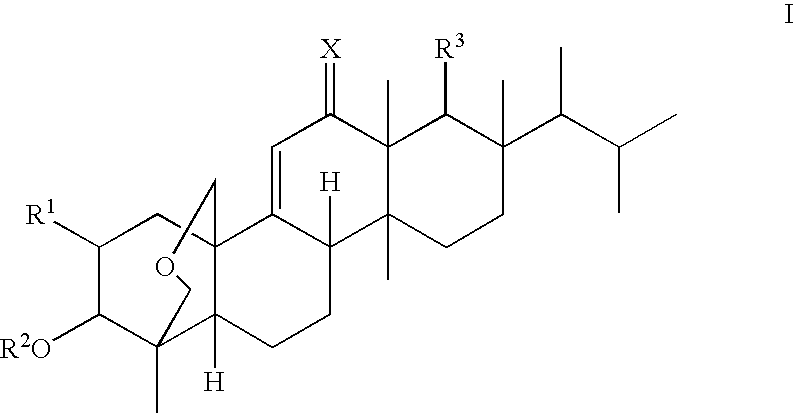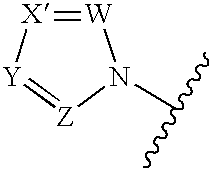Antifungal agents
a technology of antifungal agents and active ingredients, applied in the field of antifungal agents, can solve the problems of increasing the incidence of hospital-acquired fungal diseases and the commonity of treatment failures, and achieve the effect of preventing or treating mycotic infections
- Summary
- Abstract
- Description
- Claims
- Application Information
AI Technical Summary
Benefits of technology
Problems solved by technology
Method used
Image
Examples
preparation 1
[0253]
2-isopropyl-2-methyl-1-[(4-methylphenyl)sulfonyl]aziridine
[0254]To a solution of 2,3-dimethyl butene (300 ml, 2.42 mol) in 7.8 L of dry acetonitrile was added Chloramine-T (749.9 g, 1.1 eq) portionwise over 90 min. The temperature was maintained at approximately 20° C. To this reaction mixture was added phenyltrimethylammonium tribromide (91.4 g, 0.1 eq) in 10 g portions over 90 min. The temperature increased to 26° C. during the addition. The reaction mixture was stirred at room temperature for 2 days. The reaction mixture was concentrated down to approximately 15% of the initial volume and was them filtered, washing the solid with 1 L of acetonitrile. The organic liquid phase was concentrated and the residue dissolved in 2.5 L of EtOAc. The resulting solution was washed twice with water, dried over MgSO4, and concentrated to give a solid. The crude was purified on a large plug of Celite using gradient elution 5% to 25% EtOAc / heptanes to afford 317 g of 2-isopropyl-2-methyl-1...
preparation 2
[0255]
(2R)-2-isopropyl-2-methyl-1-[(4-methylphenyl)sulfonyl]aziridine
[0256]Step 1
[0257](R)-α-methylvaline (8.05 g, 61.4 mmol) was added in small portions to a cold (0° C.) solution of LiAlH4 in THF (1M, 123 mL, 123 mmol), maintaining the reaction temperature below 15° C. The reaction was stirred at 0° C. for a few minutes then heated at reflux for 4 h. The reaction mixture was cooled to RT and quenched by addition of sodium sulfate decahydrate / celite (1:1 by weight) until gas evolution ceased. The reaction mixture was filtered, washing with THF and methanol. The filtrate was concentrated under reduced pressure to provide 4.7 g of amino alcohol as a colorless oil.
[0258]Step 2
[0259]To a solution of the amino alcohol product from Step 1 (4.70 g, 40.1 mmol), Et3N (22.36 mL, 160 mmol) and 4-dimethylaminopyridine (0.490 g, 4.01 mmol) in anhydrous CH2Cl2 (200 mL) at 0° C. was added p-toluenesulfonyl chloride (22.94 g, 120 mmol) in portions during 10 min. The reaction mixture was stirred at...
preparation 3
[0261]
(2S)-2-isopropyl-2-methyl-1-[(4-methylphenyl)sulfonyl]aziridine
[0262]Step 1:
[0263]NaBH4 (94.5 g, 2.498 mol) was charged into a 5 L three-necked flask containing 540 ml of dry THF. This solution was cooled with an ice bath. The (S)-α-methylvaline (75 g, 0.572 mol) was added to this solution. The mixture was stirred for 20 min under N2 then a solution of H2SO4 (66.7 ml, 1.252 mol) in 160 ml of dry ether was added dropwise over a period of 3.5 h. The reaction mixture was stirred for one hour while in the ice bath then allowed to warm to RT overnight. TLC in CH2Cl2 / MeOH (70 / 30) indicated the reaction was complete. The reaction was cooled with an ice bath and quenched by the slow addition of 250 ml of MeOH over 45 min. The mixture was then stirred at RT for 15 min then NaOH (5N, 700 ml) was added very slowly. The flask was equipped with a distillation head and heated to 100° C. with a heating mantle. The volatiles (bp2Cl2 (6×500 ml). The combined organic layers were dried over Na2S...
PUM
 Login to View More
Login to View More Abstract
Description
Claims
Application Information
 Login to View More
Login to View More - R&D
- Intellectual Property
- Life Sciences
- Materials
- Tech Scout
- Unparalleled Data Quality
- Higher Quality Content
- 60% Fewer Hallucinations
Browse by: Latest US Patents, China's latest patents, Technical Efficacy Thesaurus, Application Domain, Technology Topic, Popular Technical Reports.
© 2025 PatSnap. All rights reserved.Legal|Privacy policy|Modern Slavery Act Transparency Statement|Sitemap|About US| Contact US: help@patsnap.com



